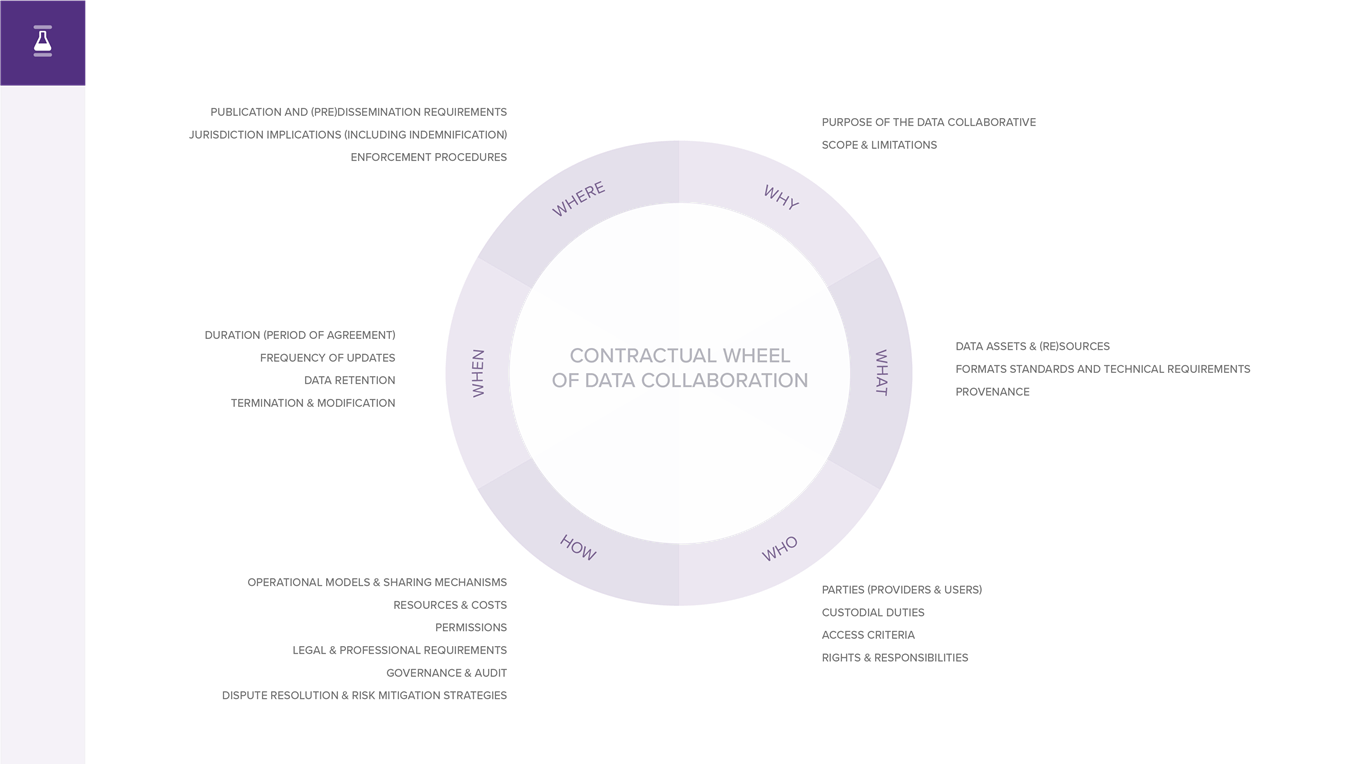Our analysis of data sharing agreements (DSAs) organized around 6 categories of questions as represented in the Contractual Wheel of Data Collaboration. Created by the GovLab and built from an assessment of legal agreements, this wheel and C4DC’s online library of legal clauses were the bases for our analytical framework. They can also serve as a guide for users to gain a better understanding of the nature and function of data sharing agreements.

The contractual wheel starts with general categories that naturally emerge in data stakeholder discussions, and then offers increasingly detailed sub-analysis in a logical sequence from those general categories, in an effort to demystify structured data actions and facilitate user understanding of real-life DSAs. The analytical framework and the data collaboration concept are intended to address the lack of clarity around these data sharing and data action issues that often results in high transaction costs and significant delays during the process of negotiating the terms of a DSA.
The categories are described below, with linked examples from the C4DC library.
- WHY is data being shared? What is the context and purpose?
- WHAT kinds of data are being shared? What are the sources, formats, and other technical requirements?
- WHO is party to the agreement? Who will be providing and using data resources? Are there any other ‘third parties’ that are also involved? Who has certain rights and duties?
- HOW are data being shared? How is the relationship managed? How will issues such as security, privacy, and risk be handled?
- WHEN will data actions take place? At what point does the agreement start and end?
- WHERE are data being shared to and from? Are there jurisdictional issues to consider? Are there any international laws that apply?
For example:
An agreement between UN Environment and Google regarding water data addresses the question “When is the agreement in effect?” as follows:
"To ensure holistic monitoring of the environmental dimension of sustainable development, the Parties also agree to collaborate in terms of data dissemination and visualization. Under this area of collaboration, the Parties agree to make derived data products of the collaboration public and freely available (when possible based on the license of input datasets, other partner restrictions and Google’s commercially reasonable efforts) in the spirit of open data and using standard formats for distribution when possible. The derived products will be available for visualization and downloading within the respective digital ecosystems of both Google and UN Environment. This work will build upon the existing expertise of Google in terms of Google Earth Engine and UN Environment in terms of MapX."
An agreement between multiple government and private sector actors in British Columbia, Canada regarding meteorological data addresses the question “How will security and confidentiality be protected?” as follows:
“Each Party will: [...] Retain responsibility to maintain a Party’s respective Network and ensure the integrity and security of its Weather Stations, data polling, databases and reporting systems.”
“This Agreement is subject to the Freedom of Information and Protection Privacy Act of British Columbia.”
“Subject to any law requiring a Party to disclose information in its possession, including the Freedom of Information and Protection of Privacy Act, the Parties will treat as confidential all information or Materials which are clearly marked as confidential or proprietary.”
Explore the C4DC library for more sample language.
For more on this analytical framework, read Partnerships founded on trust: Introducing Contracts for Data Collaboration (C4DC) (Contracts for Data Collaboration, 2019).